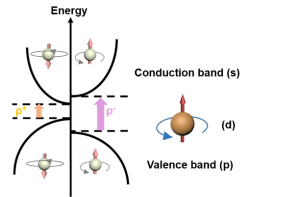Summary
Leakage current in electronic components is one of the limiting factors for the performance of conventional computers which use charges and currents as physical information carriers. Spintronics offers an alternative by using electron spin for information transfer, processing and storage, enabling the design of non-volatile computer memory and more energy-efficient electronic devices. In this project, we develop a new class of low-dimensional quantum materials for spintronics applications, which are based on colloidal metal halide perovskite semiconductor nanostructures. We explore the control of spin polarization in these systems based on magnetic exchange interactions between dopant centers and the nanocrystal charge carriers. A particular focus is on tuning spin exchange interactions by the selection of dopants and the ability to compositionally modulate nanocrystal band structure. Beyond spintronics, our results on spin interactions in metal halide perovskite nanostructures could open a new field of material research and ultimately result in new approaches to quantum information processing.
Related Content

Combined momentum- and real-space photoelectric probes of dimensionality-tuned Weyl semimetals
Summary The library of two-dimensional (2D) materials has recently grown to include topological insulators and semimetals. Their incorporation in special device geometries may lead to novel quantum electronics with enhanced functionalities. Weyl semimetals, in particular, offer the most robust form of topological protection. Recent results from our group indicate that Weyl nodes should be […]
March 12, 2019

Micro-Supercapacitors Based on Termination Optimized MXene Quantum Dots with Ultra-High Rate Capability and Fast Frequency Response
Micro-supercapacitors (MCs) are miniaturized energy storage devices that can enhance the performance of wearable health devices, medical implants, wireless sensors, and micro-electromechanical systems due to their fast frequency response, long life cycle, and vast temperature operation. However, to make these MC systems into commercially feasible products, necessary improvements to current MC performance are necessary, primarily […]
June 12, 2023
Spin-transfer Torque Magnetic Random Access Memory for On-chip Spin Information Storage
Summary Leakage power in semiconductor memories, such as Dynamic Random Access Memory (DRAM) and Static Random Access Memory (SRAM), can be substantial and is one of the limits for scalability of classical electronics. This is attributed to the fact that the information stored is volatile, requiring constant refreshing, as well as reprogramming upon powering […]
August 6, 2018



